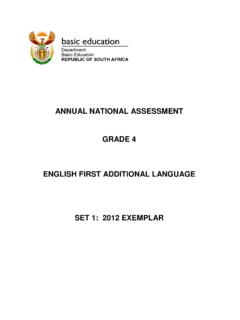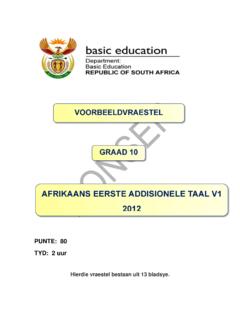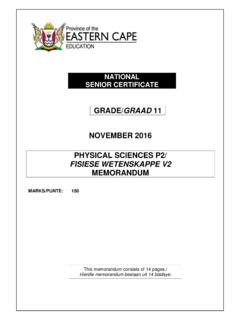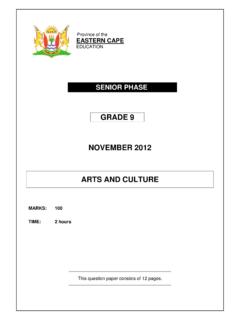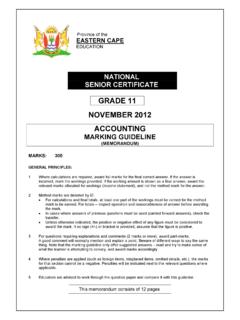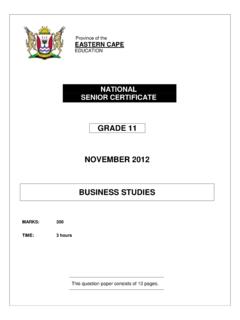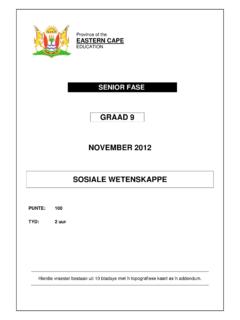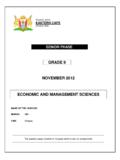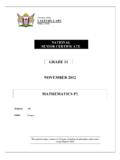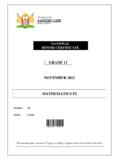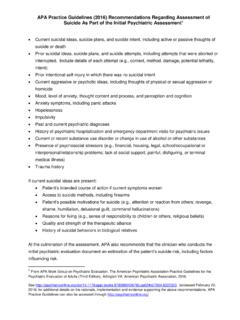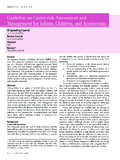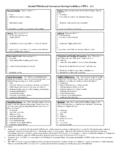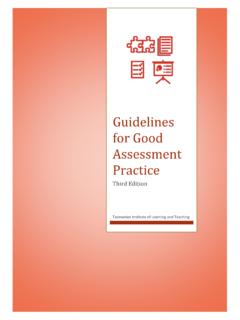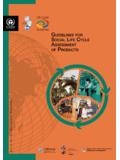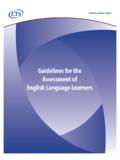Transcription of PROVINCIAL ASSESSMENT GUIDELINES FOR …
1 F O U N DAT I O N P H A S E G R A D E R TO G R A D E 3. Province of the Eastern Cape DEPARTMENT OF EDUCATION. ISEBE LEZEMFUNDO. DEPARTEMENT VAN ONDERWYS. Private Bag X0032, BISHO, 5605, SOUTH AFRICA. CURRICULUM DEVELOPMENT. PROVINCIAL ASSESSMENT . GUIDELINES . FOR. FOUNDATION PHASE. GRADES R to 3. 2008. 1. PROVINCIAL ASSESSMENT GUIDELINE DOCUMENT. Foreword The DIrectorate: Curriculum ECD and GET programmes of the Eastern Cape Department of Education in collaboration with the district curriculum personnel, provincialised the National ASSESSMENT GUIDELINES for the Foundation Phase with the purpose of increasing the capacity of teachers to have a clear picture on the process of ASSESSMENT in general and on continuous ASSESSMENT in particular.
2 This document, the PROVINCIAL ASSESSMENT GUIDELINES for Foundation Phase, is a working document. Critical engagement with the document is encouraged. Inputs, suggestions, recommendations and exemplars on ASSESSMENT related matters that will strengthen this document are invited from all stakeholders, especially school managers and educators. It is hoped that this process will assist the province to finalise a more realistic, practical and authentic guideline that will provide the necessary clarity and guidance educators need to manage the ASSESSMENT process more effectively and with confidence.. Dr F. Peters Director: Curriculum ECD & GET Programmes For inputs into this document please contact : Dr T.
3 Reddy Tel no: 040 6084780. Ms A. Minnaar Tel no: 040 6084667. 2. F O U N DAT I O N P H A S E G R A D E R TO G R A D E 3. TABLE OF CONTENTS. CONTENT PAGE. FOREWORD 2. 1. INTRODUCTION 4. 2. ASSESSMENT 4. 3. DIVERSITY AND INCLUSIVITY 4. 4. LEARNING STYLES 7. MULTIPLE INTELLIGENCES 8. LINK WITH LEARNING STYLES AND MULTIPLE INTELLIGENCES 8. 5. PLANNING FOR ASSESSMENT 10. RELATIONSHIP BETWEEN PLANNING AND ASSESSMENT 10. PREPARING THE LEARNERS FOR ASSESSMENT 11. 6. SCHOOL ASSESSMENT POLICY 12. SCHOOL ASSESSMENT PLAN 12. FORMAL ASSESSMENT TASKS (FAT) 12. PROGRAMME OF ASSESSMENT 13. 7. FORMS OF ASSESSMENT 14. ASSESSMENT STRATEGIES 14. 8. PROVINCIAL CASS POLICY 15.
4 9. RECORD KEEPING 18. THE NATIONAL CODES AND DESCRIPTORS 18. ASSESSMENT TOOLS FOR RECORDING LEARNER'S ACHIEVEMENTS 19. 10. PROGRESSION IN FOUNDATION PHASE GRADES R-3 20. PROGRESSION AND PROMOTION IN THE GET GRADES 1-9 20. SOME SUGGESTED PROGRESSION GUIDELINES 20. 11. THE REPORTING PROCESS IN FOUNDATION PHASE 21. EXEMPLARS / ANNEXURES 24 - 57. ACKNOWLEDGEMENTS 58. 3. PROVINCIAL ASSESSMENT GUIDELINE DOCUMENT. 1. INTRODUCTION. This document serves to highlight issues on ASSESSMENT in the Foundation Phase (Grade R 3). Emphasis is on school based ASSESSMENT . The document should be read and utilized in conjunction with the Assess- ment GUIDELINES for Foundation Phase Grades R 3 and all relevant documents on ASSESSMENT (refer to the ASSESSMENT GUIDELINES for Foundation Phase Grades R 3 page 7).
5 Therefore the purpose of this document is not to repeat any part of the national ASSESSMENT GUIDELINES which are based on the ASSESSMENT policy of February 2007 but merely to expand on issues not clearly stated yet crucial for micro planning of learner ASSESSMENT . It is intended to provide educators with clear, user friendly, practical and valid GUIDELINES on managing and implementing ASSESSMENT in the Foundation Phase. It provides GUIDELINES for ASSESSMENT in Foundation Phase Grades R-3 and gives effect to the National Cur- riculum Statement (NCS). It provides teachers with suggested ideas to plan and manage ASSESSMENT , keep records and report on learner achievement in the three Learning Programmes defined for Foundation Phase: LITERACY.
6 NUMERACY. LIFE SKILLS. The focus of this document will be on understanding the diversity of ASSESSMENT , criteria for developing a school policy on ASSESSMENT , a programme of ASSESSMENT , user friendly and practical exemplars on rubrics, the recording and reporting of the planning and ASSESSMENT process, understanding barriers to teaching and learning as well as the associated teaching and learning styles. The standardization of the process of ASSESSMENT through the use of a Cass Moderation Tool is also illustrated in this document at school, cluster and district level. 2. ASSESSMENT . The ASSESSMENT GUIDELINES for Foundation Phase Grades R 3 (pages 8 13) explains the following as- pects clearly: How do the ASSESSMENT standards inform the teaching and learning process?
7 The principles and purpose of ASSESSMENT . The types of ASSESSMENT . Outcomes based ASSESSMENT . Language and ASSESSMENT . ASSESSMENT and the needs/learning styles of learners 3. DIVERSITY AND INCLUSIVITY. Inclusivity is one of the components of the Principles of the NCS. Inclusion is a curriculum issue. One of the most significant barriers to learning for learners in special and ordinary schools is the curriculum. Barriers to learning arise from the different interlocking parts of the curriculum (WP 6 page 19). White Paper 6 guides Curriculum practice as regards to Inclusivity in South Africa and it becomes necessary for all involved in education to correctly interpret and implement this policy.
8 Inclusion is about including every learner in the classroom and the following Key Principles must be con- sidered to accommodate all learners: 4. F O U N DAT I O N P H A S E G R A D E R TO G R A D E 3. Every class is a multi-level class Use the curriculum ladder / cascade/ unpack the ASSESSMENT Standards Integrate differentiation strategies into planning Team building and Team problem solving Trust own problem solving strategies Effective classroom management strategies Progression does not mean Promotion Individual support Plans Inclusion strategies enhances quality teaching Inclusivity requires Creative, Reflective and Responsive educators Educators need to be supported to manage the planning, teaching and ASSESSMENT process especially to cater for learners with special needs.
9 Diversity is acknowledging the principle that learners learn at their own pace and are influenced by their learning styles. Learning styles are influenced by learners' influences and other mediating factors as indi- cated below: LEARNING STYLES. INFLUENCES MEDIATING FACTORS. Personality Culture Environment School climate Thinking style Expectations Self-awareness Teaching style Classroom practices Some learners in the classroom experience the following barriers: Visual barriers Communication barriers Physical barriers Cognitive barriers Social and environmental barriers Auditory barriers (refer to GUIDELINES for Inclusive Learning Programmes 2005 pg 102).
10 An exemplar of a Lesson Plan to demonstrate how learners with different learning styles and intelligences can be accommodated: Planning around the story of Handa's Surprise/Little Red Riding Hood A story about a little girl walking through the woods and sharing her basket of fruits with the animals. LEARNING OUTCOME LITERACY NUMERACY LIFE SKILLS. LO 1 Listening Numbers, Operations and Health Promotion Relationships Activities: Teaching , Learning and ASSESSMENT Listen to Handa's Surprise/ Little Red Riding Hood use pictures and other materials eg. puppets, basket of fruits Enact the story (pupils volunteer). 5. PROVINCIAL ASSESSMENT GUIDELINE DOCUMENT.
